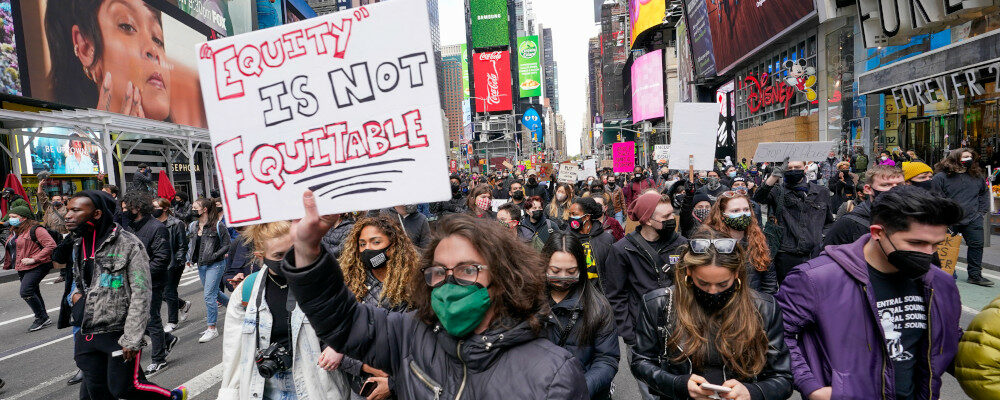Review of: How Race Trumps Merit: How the Pursuit of Equity Sacrifices Excellence, Destroys Beauty, Threatens Lives
Author: Heather Mac Donald
Publisher: DW Books, 2023
The last few years have seen a flurry of books on how merit has deepened the divide between the haves and have-nots, leading to political polarization, discontent, and the rise of populism. The latest is Michael Sandel’s The Tyranny of Merit. Sandel, who teaches political theory at Harvard, argues that society’s elites have come to believe they deserve their high incomes. This implies that those left behind have only themselves to blame for their failures. This odious notion rips at the fabric of a democratic society when markets alone determine the worth and value of human occupations regardless of their status. Sandel believes success also depends on chance and good fortune and not just effort and hard work, attributes that are randomly dispersed by nature and God, and, therefore, unearned.
Sandel argues for a shift in attitude that appreciates the dignity of all work, especially work that keeps our streets clean and comforts the sick. He reminds us that though education is available to all, elite schools continue to be dominated by the children of the wealthiest families, perpetuating a class of successful, highly educated workers that hand down their wealth and power from generation to generation.
The conventional argument in defence of a meritocratic system is that even if markets don’t fairly distribute income, we end up with a more efficient economy and a more prosperous society if those with talent run things. In The Meritocracy Trap, Daniel Markovits, a legal scholar at Yale, questions this argument. Elites have produced a “super hypereducated class” that has bent the arc of innovation, favouring technology that uses their talents over less skilled but efficient labour. One example is in financial services. What was once considered a midlevel profession, such as loan officers, is now dominated by highly specialized professionals who know all about the complex world of derivatives and earn supercharged incomes for that knowledge. The financial crisis of 2008 dispelled us of their true worth.
Since markets do a poor job of determining value, who should be in charge? Cultural and institutional administrative elites have taken up that task. Over the past few years, we are getting a better picture of the dangers that lie ahead. Since white privilege and racial discrimination are the problems, eliminating both is the solution. The objective is no longer to raise the educational standards of minorities—that has proven too hard to do—but to do away with testing altogether while blaming Western culture for persistent racism.
That’s the message in a recent book, When Race Trumps Merit, by Heather Mac Donald, a senior fellow at the Manhattan Institute. The death of George Floyd was so shocking that it transformed racial relations driven by a sense of “white guilt,” an idea articulated by the Black scholar Shelby Steele. After the Civil Rights Movement in the U.S., many believed that affirmative action programs would be temporary and one day no longer necessary. That day never arrived. Leaders of elite and cultural institutions, including universities, scientific research centres, government agencies, art galleries, and major corporations—all encouraged by big media—no longer believe racism will diminish with time, especially given the stubborn wide disparities in test scores between the races. Administrative elites are determined to right the wrongs of history by rebalancing jobs based on race and gender.

Mac Donald’s book is a horror story of examples of inferior candidates promoted over more qualified applicants. The highly respected journal Nature accused itself of being a “white institution responsible for bias in research and scholarship.” The goal now is to increase minority participation in science-based occupations, not the virtue of rewarding excellence. For its part, Queen’s University has reserved ten spots for Black and Indigenous students for medical school after two years of undergraduate work without writing the Medical College Admission Test. This is so that the faculty of medicine can “become a leader in cultural safety, anti-racism, anti-colonialism, and anti-oppression in health education.”
Even health disparities between the races are blamed on racism. While academic bureaucrats are watering down academic standards for the sake of racial parity, the Chinese are pouring out PhD STEM graduates. Even in the arts, any European influence is under attack as racist to the point that “not one leader” dare defend the canonical repertoire of Western classical music. Instead, Juilliard’s director of equity, diversity, and inclusion creates a Black-only Zoom “space for healing” while the school’s director of music writes, “It’s high time the whiteness of music theory is examined, critiqued and remedied.”
Critics of elitism are generally correct that a society based solely on merit moves society in the wrong direction. But when committees, or commissars, take over the central role of markets, the route for society takes an even more dangerous turn. Mac Donald’s book asks what happens to a culture that condemns its history, technology, and arts so completely. We are about to find out.




